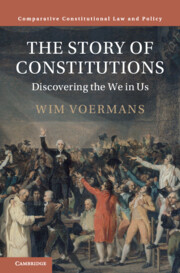Book contents
- The Story of Constitutions
- Comparative Constitutional Law and Policy
- The Story of Constitutions
- Copyright page
- Dedication
- Epigraph
- Contents
- Figures
- Prologue
- 1 Introduction
- Part I Constitutional Diffusion
- Part II The History of the Constitution
- Part III Concepts, Shapes and Types of Constitutions
- Part IV Effects
- Part V The Imagined Order of the Constitution
- 24 The Constitution’s Beating Heart
- 25 The Roots of the Tree of Knowledge
- 26 Constitutions as Vehicles for Legitimacy
- 27 The Story of the Constitution
- 28 Appealing to the Imagination
- 29 Once upon a Time … There Was the Constitution
- References
- Name & Author Index
- Subject Index
25 - The Roots of the Tree of Knowledge
from Part V - The Imagined Order of the Constitution
Published online by Cambridge University Press: 19 October 2023
- The Story of Constitutions
- Comparative Constitutional Law and Policy
- The Story of Constitutions
- Copyright page
- Dedication
- Epigraph
- Contents
- Figures
- Prologue
- 1 Introduction
- Part I Constitutional Diffusion
- Part II The History of the Constitution
- Part III Concepts, Shapes and Types of Constitutions
- Part IV Effects
- Part V The Imagined Order of the Constitution
- 24 The Constitution’s Beating Heart
- 25 The Roots of the Tree of Knowledge
- 26 Constitutions as Vehicles for Legitimacy
- 27 The Story of the Constitution
- 28 Appealing to the Imagination
- 29 Once upon a Time … There Was the Constitution
- References
- Name & Author Index
- Subject Index
Summary
Constitutional norms create an imagined world of law and political (leadership) order: a story spanning the gap between emotions, sentiments, and social order. Emotions and sentiments enable us to assess not only our physical environment and act accordingly, but also to vet our relationships with others, even to value our own thinking and conduct – that is, morality. This chapter demonstrates the role morality plays in constitutions and constitutional law. It lies at the heart of what we call natural law (pre-existing, prerequisites to law and constitutions), and the rules of recognition we use to decide whether law is actually and truly valid law. This natural law line of thinking is opposed to the positive law school of thought. The chapter ends with the question whether there is something like universal morality and whether constitutions are reflections of of basic morality.
Keywords
- Type
- Chapter
- Information
- The Story of ConstitutionsDiscovering the We in Us, pp. 296 - 310Publisher: Cambridge University PressPrint publication year: 2023

